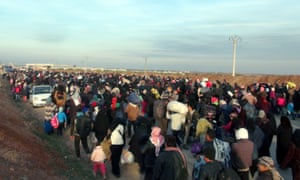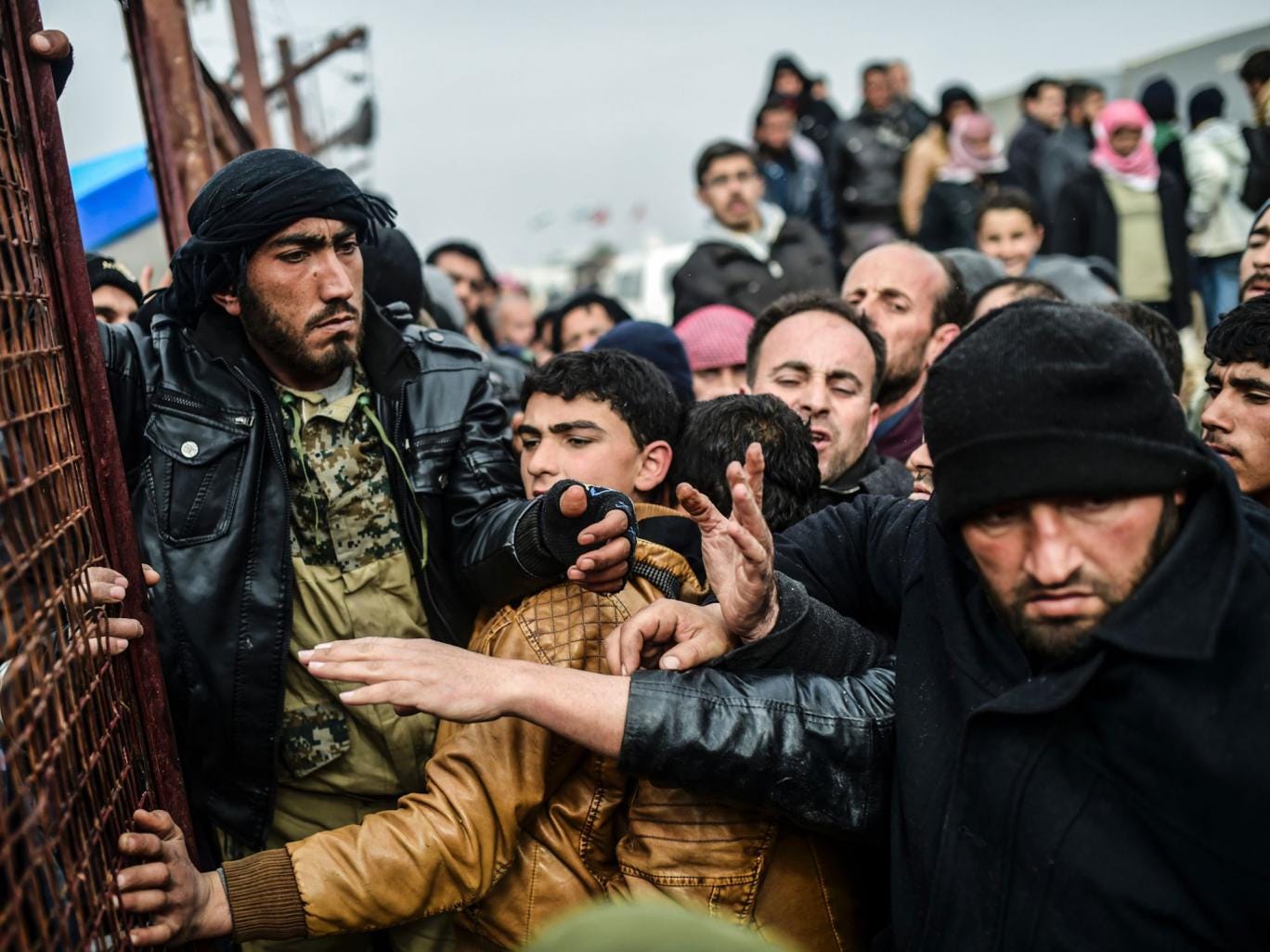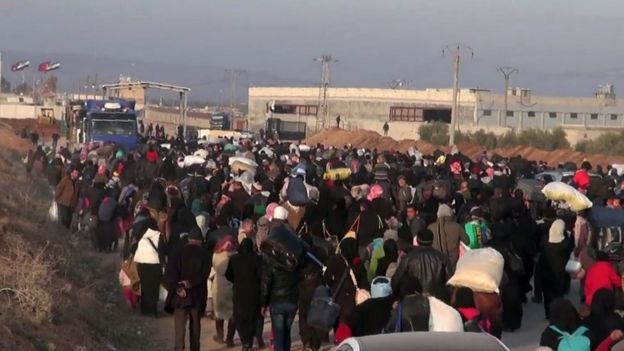Fleeing Aleppo
 |
| Syrians make their way to the Esselame border gate, in the Turkish province of Kilis, as they flee airstrikes in and around Aleppo. Photograph: Anadolu Agency/Getty Images |
"In the last three days, Aleppo came under attack from Russian warplanes as well as regime force and foreign fighters fighting along[side] them."
"They are trying to [lay] siege [to] Aleppo and condemn it [to] starvation."
Turkish Prime Minister Ahmet Davutoglu
"[A siege of Aleppo capturing the northern supply line] would effectively diminish Turkey's say over the war in Syria, while leaving it exposed to a growing refugee crisis."
Nihat Ali Ozca, analyst, Economic Policy Research Foundation of Turkey, Ankara
"Now there are thousands of people from Azaz all waiting on the other side. They escaped from Russians. I want to go and take my relatives. They are bombing Syrians all the time."
"Many people have left Aleppo. But still there are many civilians there. If Russia is successful, we are all dead."
Ahmet Sadul, 43, Syrian refugee, Kilis, Turkey
 |
| Refugees push each other as they wait for tents at the Bab-Al Salam crossing AFP/Getty Images |
Supported by Russian air power and Hezbollah militias, President Bashar al-Assad's military surrounds Aleppo, according to Rami Abdurrahman of the U.K.-based Syrian Observatory for Human Rights. This encirclement has cut off rebel forces from their vital supply lines via Turkey. The siege has forced the United Nations to recognize the immediate futility of the peace conference it has pinned hopes on to achieve some level of accommodation toward a cessation of hostilities.
The rebel groups were always hesitant about accepting the need to be represented at such peace talks, simply because they knew it was folly to depend on the Syrian regime to commit to anything resembling a ceasefire at a juncture in the conflict when it has realized the ascendancy, thanks to Russian involvement having achieved what Iranian al Quds Revolutionary troops along with Iran-sponsored Hezbollah militias could not.
As for the Syrian regime, it knows how to respond to Western sources imploring it to cease bombing and slaughtering its own civilians, speaking in tongues that soothingly promise it sees great merit in peace, but not for Syrian Sunnis. Unless a complete and utter surrender to the forces that have used every means at their grotesque disposal to slaughter helpless men, women and children occurs, at which time their violent persecution would simply continue to teach a final lesson, the regime had no intention of lifting its assaults.
Any thoughts that the flood of refugees out of Syria might be staunched by the effective stoppage of Assad's bloody campaign were dashed with the implacable continuation of vicious assaults against a people that has already withstood more carnage than any other single memory of wild butchery on the part of a nation's leader, leaving over a quarter million dead and seven million fleeing people in desperate transit from more of the same.
Aleppo, at one time Syria's most populous city, prosperous and united has become the backdrop while world leaders arrived in London discussing what aid, financial and otherwise could be dredged from an otherwise aid-weary global community anxious to put a halt to the bleeding corpses and the bleeding of the living out of the country to shed their citizenship and take up new ones across Europe.
There is nothing left for them of material value in Syria, nor hope for the future there.
Anticipation of a renewal of rising numbers of refugees has grown, and tens of thousands clamour at the border between Syria and Turkey, where well over two million Syrians have already been placed in refugee camps burgeoning with misery and loss. Government forces and their allied militias have overrun areas of the province of Daraa, as well, representing strategic importance between Damascus and Jordan.
Russia, Iran and the regime are angling for increased bargaining emphasis for settlement talks of the future.
 |
| AFP. The UN warns that ongoing fighting is making providing aid "increasingly difficult" |
While a representative of the European Union is reminding Turkey that the negotiated financial support given Ankara was meant specifically to aid it in continuing to offer humanitarian aid to Syrian refugees, and appealing to Turkey to allow in the additional numbers hoping to cross the border, Turkey insists it can aid them while they remain within Syria's border.
Ali Sahin, Turkey's deputy minister for EU affairs insists that Turkey was providing "every kind" of humanitarian aid required: "It will be better to settle them on the Syrian side of the border".
And it was Russia, he stated soberly, that was intent on undermining the "integrity of Europe" through its aerial bombardments driving civilians from their towns and villages. Moscow, he said, "targets not only Turkey’s security but Europe’s as well".
Vladimir V. Putin taking another avenue of revenge toward a Europe that has sanctioned Russia over Crimea and Ukraine, in a sinister ploy typical of the man using what he views as providential means to achieve his purpose.
Labels: Atrocities, Conflict, European Union, Refugees, Russia, Syria, Turkey

<< Home